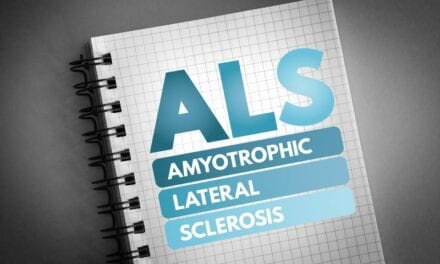An experimental drug, first tried at Columbia University Irving Medical Center as a last-ditch effort to help a 25-year-old woman with juvenile ALS, is now being tested in ALS patients in a global, phase 3 clinical trial, based on promising results from a new study at Columbia.
The study, published in Nature Medicine, suggests that the drug—informally named jacifusen—lowered levels of FUS, a toxic protein in the woman’s neurons and in mice with the disease.
The clinical trial will be pivotal in determining if the drug can slow the progression of the disease.
Though the drug was possibly too little, too late, to help the young woman who first received it, the study found that “it had a profound effect, virtually eliminating the toxic proteins in the central nervous system and reducing the burden of FUS pathology dramatically,” says study leader Neil Shneider, MD, PhD, the Claire Tow Associate Professor of Motor Neuron Disorders in the Department of Neurology and director of the Eleanor and Lou Gehrig ALS Center at Columbia University Vagelos College of Physicians and Surgeons.
“Together with our animal data, this study suggests that the drug has the potential to delay or prevent ALS caused by mutant FUS before symptoms appear or slow clinical progression after disease onset,” Scheider adds, in a media release.
The Story of Jacifusen
Jacifusen gets its name from Jaci Hermstad, the first person to receive the drug, but it was already in development before Jaci was diagnosed with ALS.
ALS is usually associated with adults, but a rare and aggressive form of the disease can affect individuals, like Jaci, in their teens or 20s. The disease attacks the patient’s motor neurons, which control the body’s muscles, until the patient can no longer move or breathe unassisted.
Several years ago, researchers discovered that most adolescents and young adults with ALS have mutations in a gene called FUS.
In a study of a series of mouse models with ALS-related FUS mutations published in 2016, and in another series in the current study, Shneider found that the mutant FUS protein is toxic to motor neurons, suggesting that lowering FUS levels by silencing the gene that makes the protein might protect neurons in ALS patients with the mutation.
In 2018, Shneider met Jaci, a young woman from Iowa whose identical twin sister had died of ALS caused by a genetic mutation in the FUS gene. Soon after, Jaci began to show signs and symptoms of ALS. Shneider immediately reached out to Ionis Pharmaceuticals—a leading developer of antisense therapeutics—looking for a drug that shuts down production of the FUS protein, which might slow the progression of Jaci’s disease. This led to the identification of ION363, a compound that effectively lowered FUS levels in the mouse brain and spinal cord and prevented disease onset in the mouse model of FUS-related ALS. However, this drug had never been tested in humans.
With remarkable speed, Shneider won special permission from the Food and Drug Administration to give the drug to Jaci through its compassionate use program, which makes experimental treatments available to seriously ill patients outside of clinical trials. There was no time to waste. “People with these mutations usually die within a year of diagnosis,” Shneider says.
Jaci received the first of several doses of the drug in 2019.
“We saw a significant slowdown in her functional decline, suggesting that the drug was working as intended, but sadly, her disease was already advanced by the time she began the treatment and she died about a year later,” Shneider says.
New Study Suggests jacifusen Eliminates Toxic Proteins
In his new study, published in Nature Medicine, Shneider found that a single infusion of jacifusen at birth in a mouse model effectively silenced the FUS gene, reduced FUS protein levels in the brain and spinal cord, and delayed motor neuron degeneration in the mice—all with no apparent side effects.
In Jaci, jacifusen also caused profound changes in the brain. Examination of Jaci’s brain tissue, donated by Jaci and the Hermstad family, found that treatment with the eponymous drug markedly reduced FUS protein clumps—a hallmark of the disease—in her brain cells.
“At a cellular level, jacifusen was extremely effective at doing what we hoped it would do,” he says.
The findings, along with encouraging signs from 10 other patients who received jacifusen under the compassionate use program, convinced Ionis to sponsor a pivotal phase 3 clinical trial at Columbia and multiple other sites in the United States, Europe and Asia. The trial, led by Shneider, will enroll at least 64 patients.
“This trial will determine if jacifusen is safe, and if it can effectively slow disease progression in symptomatic FUS-ALS patients. If approved, jacifusen would be the first treatment for this highly aggressive form of early-onset ALS,” Shneider says.
Future studies will determine if jacifusen works if given to people with ALS-associated FUS mutations before they become symptomatic, as it did in the mouse studies.
“This study is an example of truly personalized medicine in the 21st century.”
[Source(s): Columbia University Irving Medical Center, EurekAlert]





